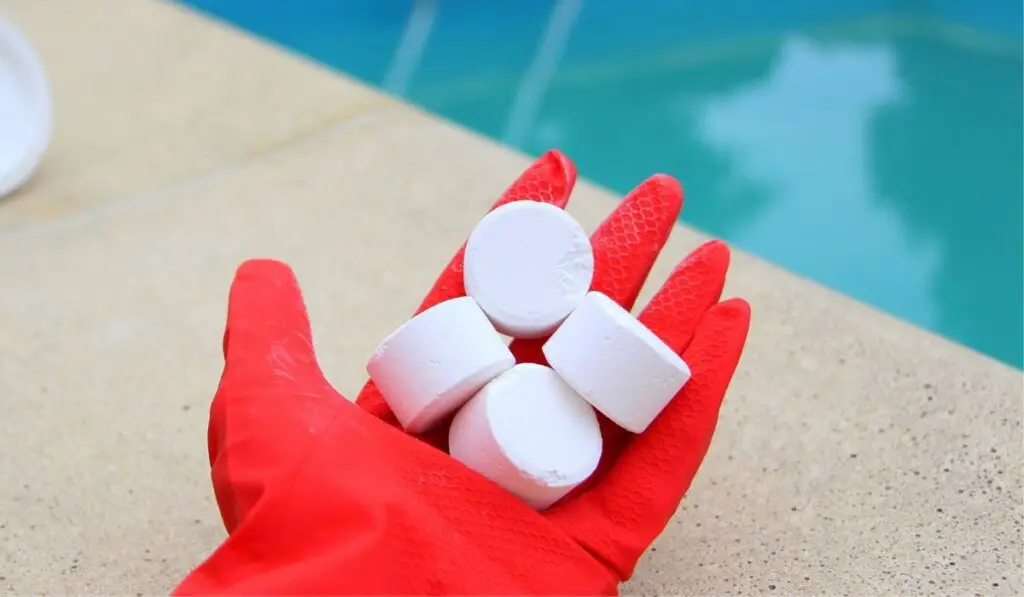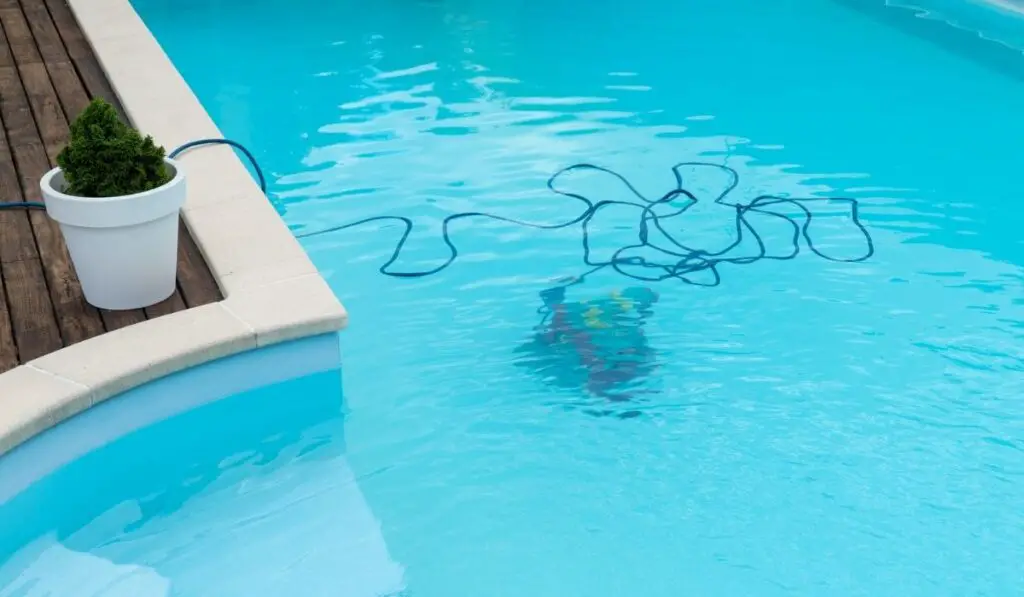The quality of your pool water is essential, and chlorine plays a huge role in keeping the water chemically balanced. Unfortunately, prices of chlorine have skyrocketed to unprecedented levels, making pool construction and maintenance even more expensive than it was. So, what has contributed to the high prices of chlorine?
Chlorine prices have increased due to a fire that took place at a major US-based chlorine-producing company following Hurricane Laura in 2020. The fire reduced chlorine supplies. Prices have also been impacted by increased demand for pools during the pandemic as well as typical supply chain issues.
If you’ve been impacted by the chlorine shortage, we’re here to help. Let’s take a closer look at the cause of the rising prices and shortages, and what choices you have if you need to keep your pool fresh, clean, and pathogen-free.
Why Is Pool Chlorine More Expensive?

Many people use chlorine tablets like these (example on Amazon) to keep their pools clean, but this chemical has become hard to find and more expensive. This poses issues for many pool owners, since chlorine is an age-old pool cleaning product with tremendous results for killing bacteria, algae, and other microorganisms.
So, what has caused the chlorine price increase?
Chemical Plant Fire
This is the major contributor to the high prices. A major chemical company in Louisiana was hit by Hurricane Laura, which led to a fire. The stock and infrastructure were destroyed, so supply and general production were affected.
The overall effect is increased demand but low supply. Therefore, a buyer must give more money for the supplier to feel ‘adequately compensated’ and accept releasing the product. This also led to increased imports to satisfy the local demand.
Increased Demand for Pools
There has been an increased demand for pools in recent years, primarily because of the COVID-19 pandemic. This is because movements were restricted and many people began working from home.
One of the few ways people could relax during the hardest days of lockdown was in a swimming pool.
Unfortunately, many businesses were closed, so the supply could not be met even with increased demand. This increased demand for pools meant more people were buying chlorine, so the prices increased.
Supply Chain Problems
The pool construction industry is a relatively large market, and it’s affected by the supply chain problems just like any other business. Here are some examples:
- The pool construction industry relies on the availability of raw materials. When raw materials such as chlorine are unavailable, there’s a shortage of supplies, which then affects their prices.
- This industry relies on the availability of skilled labor to carry out its functions. If skilled labor is unavailable, it will affect the supply chain’s effectiveness. The COVID-19 pandemic resulted in orders being queued, and they piled up due to a shortage of workers. This, in turn, impacted the availability of chlorine.
- The pool construction industry relies on transportation services to move goods from one location to another for distribution purposes. However, due to the pandemic and movement restrictions, transportation services were unavailable, thus affecting supply and the prices.
Why Is There a Shortage of Chlorine for Pools?
Over the last two years, chlorine prices have doubled, a situation that has probably never been seen before. This increase is majorly tied to the 2020 pandemic.
However, the destruction of one of the major factories also attributed to the high prices.
Economically, when demand exceeds supply, prices rise and vice versa. Therefore, when chlorine is not readily available, the costs increase because suppliers are only willing to sell at specific prices, and in most cases, above the average market price.
What Can You Use Instead of Chlorine Tablets?
Although chlorine remains a standard treatment for many pool owners, some viable alternatives to this chemical are making big waves, especially with the growing demand for green spaces. Given chlorine’s health, environmental, and cost implications, consider switching to alternatives such as:
Chemical Alternatives
The chemical substitutes you can use in place of chlorine include:
Bromine
Bromine is a popular alternative to chlorine. It’s often used in commercial swimming pools, and it’s becoming more common in home pools as well.
You can use the Aquatix Pro Pool Chemical Dispenser (on Amazon) for easier application and distribution in the pool. Bromine has a greater disinfectant power than chlorine but requires higher concentrations of bromide ion (Br-) ions dissolved in water for effective disinfection.
Different Forms of Chlorine
Even though they’re not entirely different, other chlorine forms, such as granules and liquid forms, can help you save costs compared to traditional tablets. Pool Mate 1-1308 Granules (on Amazon) are a great option because they dissolve quickly and have a higher concentration.
Hydrogen Peroxide
Hydrogen peroxide is an effective and safe chemical used to clean swimming pools. It is an oxidizer, which produces oxygen as a byproduct of its chemical reaction. This oxygen fights bacteria and other organisms in your pool water, leaving it clean and clear.
Additionally, hydrogen peroxide oxidizes metals like iron and copper to prevent staining of the pool water.
Polyhexamethylene Biguanide (PHMB)
PHMB is an ideal alternative to chlorine because it doesn’t oxidize. It is considered a broad-spectrum sanitizer/biocide because it kills all three types of germs that cause disease: bacteria, viruses, and fungi.
However, you will need an algaecide and frequent cleaning of filters, and you must drain your pool first before switching to PHMB.
Bleach
Bleach is a relatively harsh chemical that can damage your pool surface if used regularly. It’s also not particularly effective at killing algae and other organic contaminants, so if you have a pool with a lot of algae growth, bleach won’t be able to keep up.
However, it offers excellent protection to your pool.
Baking Soda
Baking soda is an excellent alternative to chlorine since it’s natural and safe for humans and can be used in conjunction with chlorine or other chemicals like liquid pool shock.
It raises your pool’s alkalinity and PH, thus improving clarity and stability.
Devices

Chemicals aren’t the only solution to keeping your pool clean. You can also use devices such as:
Mineral Pool Systems
The mineral pool system helps reduce the use of chemicals in the pool, making it a more environmentally friendly option.
Mineral pool systems use unique minerals that can be added to water to help reduce the effect of chlorine on your skin and hair. These minerals also help increase the water’s pH level and alkalinity.
The pH levels are crucial because they control how much chlorine can be used without causing damage to the skin. When you have a higher pH level, you can use more chlorine, which means less work for you as you don’t need to add more chlorine into your pool every day or two.
If you need a mineral pool system, the King Technology Inground Pool Frog (on Amazon) is a great choice and offers great value.
Saltwater chlorinating system
Saltwater chlorinating systems such as CircuPool CORE35 Salt Chlorinator System (on Amazon) help oxidize the water and remove any unwanted contaminants. The system works by using a saltwater generator, which is a device that produces chlorine gas from sodium chloride (salt).
This saltwater chlorination system is versatile and can be used in residential and commercial swimming pools. It helps to keep the pool clean and sanitary for swimmers while also maintaining the water’s pH level at a desirable level.
Some of the benefits that salt chlorination provides to swimming pool owners include:
- Lower Costs: Salt chlorination is less expensive than other forms of pool treatment because you don’t need to buy chemicals or minerals. The only costs associated with this pool treatment are replacing your salt cell every few years and maintaining your equipment.
- Eco-Friendly: Salt chlorinators use less electricity than other pool equipment because they don’t require pumps or motors that use energy to operate. This lowers your carbon footprint.
- Environmentally Safe: Salt chlorinators use only table salt as a source of chlorine gas, which means there are no harmful chemicals released into the environment during the system’s operation.
Ozonator
An ozonator system can clean your water and help you keep your pool healthy. This system also helps eliminate bacteria, algae, and other dangerous microorganisms from your water. Additionally, it helps remove chemicals such as chlorine and gives you better water quality.
An ozone generator is a device that produces ozone gas which can be added to pool water through a skimmer or vacuum line. This ozone breaks down any organic matter and bacteria in the water, making it suitable for swimming. It also helps remove foul odors from the water and leaves a fresh smell behind.
There are many brands, but if you need a simple and cost-effective one, you can opt for the SP-3G Swimming Pool Ozone Generator (on Amazon)
